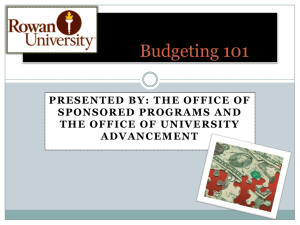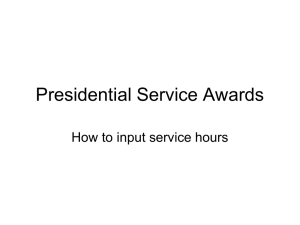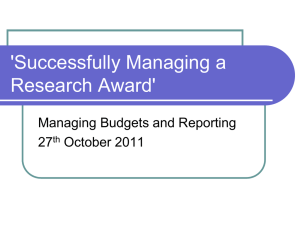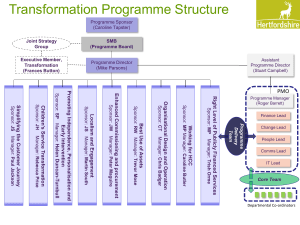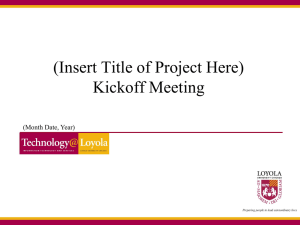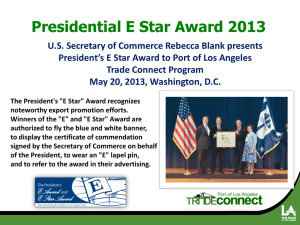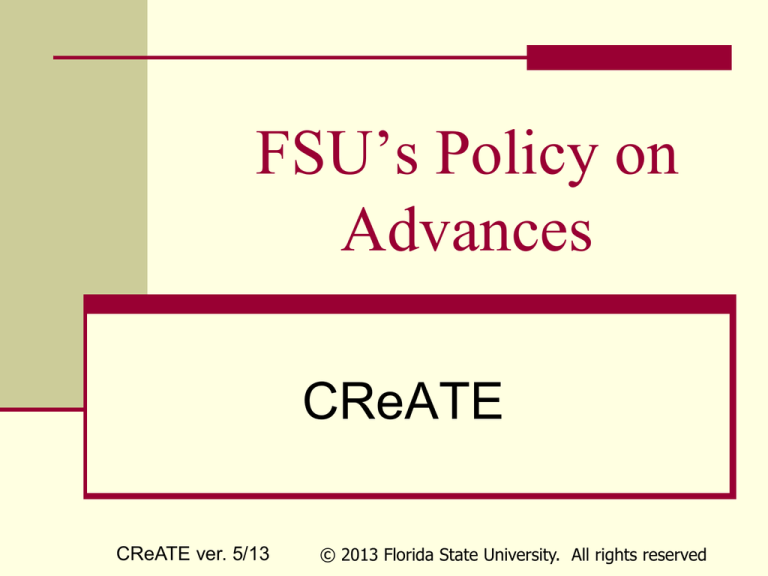
FSU’s Policy on
Advances
CReATE
CReATE ver. 5/13
© 2013 Florida State University. All rights reserved
Policy
Policy on Advances for
Externally-Funded Projects
and Initiating Work
without an Award
Purpose of Policy
To ensure the timely start-up (or
uninterrupted continuation) of sponsored
projects before a fully-executed award or
amendment is received.
Policy
Without an advance authorized by SRS/FSURF:
Absolutely no work is to be started; and
Subcontractors cannot be authorized to start work.
(Even
with an approved advance, subcontractors are rarely authorized to work prior to
FSU’s receipt of the award.)
Costs incurred prior to advance approval will not be
allowed to be charged or transferred to the new project,
or any other sponsored project.
Applicability
This policy is applicable to:
Externally-funded projects that have been
approved for funding, and/or
Extensions for which fully-executed award
documents have not been received.
Criteria for Authorization
All of the following criterion should be met for an
advance to be considered:
1.
Sponsor assurance of funding has been
received.
2.
There is a valid reason for the advance.
3.
The department or college has agreed to
provide backing.
Criterion #1 – Sponsor Assurance
The University should receive written or verbal assurance
from the sponsor that a project has been recommended for
funding.
The assurance should include:
Recommended start and end dates,
Amount of initial obligation of funds,
Project budget (if different from the proposal), and
The anticipated receipt date of an award document.
Criterion #2 – Valid Reason
The valid reason must be that any delay in starting or
continuing critical program requirements may
adversely impact the program or significantly increase
the cost.
Critical program requirements include but are not
limited to:
The continuation of essential project employees; or
Urgent project expenses (such as purchasing
equipment or traveling) require immediate action.
Criterion #3 – Backing
The department shall assume the risk by providing
financial backing of all direct costs advanced.
NOTE: The department is advised to limit its exposure to
risk by limiting the amount of advance and/or the
period of the advance.
Responsibilities
Principal Investigator
Ensure that FSU employees do not start work nor
incur project expenses without an approved
advance.
Ensure that subcontractors do not start work without
a fully-executed subcontract.
Stop work or request an additional advance if the
advance period expires or the advance funding has
been exhausted.
Responsibilities
Chair/Director/Dean
Authorize advance accounts.
Ensure sure that charges on the advance project
are absolutely essential and cannot be deferred.
Ensure that the PI stops work when the advance
period expires or funding is exhausted.
Assume the risk for costs incurred on advances.
Responsibilities (cont’d)
SRS/FSURF
Review appropriateness of advance request, and
approve as needed.
Follow up with the sponsor, in conjunction with the PI,
about the anticipated award.
Risks Associated with Advances
For cost reimbursable awards, costs may be
disallowed if they are incurred outside the
approved period of performance or budget.
The University may not be able to accept the
award if the terms are unacceptable and the
sponsor refuses to change them.
Risks Associated with Advances
The sponsor may decide not to issue an award.
Starting work (performing services and/or
delivering work product) may be construed as
automatic University acceptance of the award
terms and conditions, resulting in the University
having a poor negotiating position.
Reminder
Costs incurred prior to approval of an advance will
not be allowed to be charged or transferred to
the new project, or any other sponsored project.
Questions
Program Income
CReATE
CReATE ver. 5/13
© 2013 Florida State University. All rights reserved
Policy
Applies to externally-sponsored
projects
Does not apply to revenue generated
by sources other than sponsored
projects
Definition
Gross income that is directly
generated by a supported activity,
or earned as a result of a
sponsored project.
Examples
Program Income includes, but is not limited
to:
Conference/workshop registration fees;
Fees for services performed, such as
laboratory tests;
The sale of software, publications, research
animals; and
License fees and royalties on patents and
copyrights.
Background
Sponsors provide funding to cover costs of
conducting research, training, and public
service-related activities.
Program income may be generated as a result
of these activities and in some cases must be
reported to the sponsor.
Federal regulations document the rules
regarding program income.
F&A Costs
F&A should be included when determining the
registration fee, price of materials, etc.
F&A will be charged to program income
accounts at the same rate applied to the
sponsored agreement which generates the
income.
Treatment
Four methods of treating program income:
1. Additive Method – Income is added to the funds
obligated by the sponsor (and the University if cost
sharing is involved), and used to further eligible
project activities or objectives.
2. Deductive Method – Income is deducted from the
amount of project costs to be reimbursed by the
sponsor.
Treatment (cont’d)
3. Matching Method – Income is used to finance the
costs of a project not borne by the sponsor (i.e.,
used to fulfill matching or cost sharing
requirements).
4. Additive/Deductive Alternative – Income received
up to a maximum amount is added to the funds
obligated by the sponsor. After the maximum
amount is reached, the income is deducted from
sponsor obligation.
Use of Income
Program income revenue should be used before
expenses are reimbursed by the sponsor.
Program income must be spent in accordance with
the award and OMB Circular A-21.
Expenses that are unallowable on the sponsored
project may also be unallowable on the program
income account.
Reporting
Program income will be included in official financial
reports and/or invoices submitted to the sponsor
by SRAS, if required by the terms of the award.
The following is not reportable as program income:
Royalty income.
Income received on non-Federal awards that
contain no accounting or reporting requirements
for program income.
Responsibilities
Principal Investigator
Ensure that any activity that could generate program income
is disclosed to SRS/FSURF.
Maintain documentation related to the use of facilities or
attendance of workshops, conferences, etc.
Invoice for fee, product or service and deposit income through
SRAS or FSURF as appropriate.
Monitor account expenditure levels to ensure that program
income is spent first as appropriate.
Ensure that costs charged to the program income account are
allowable per OMB Circular A-21.
Responsibilities (cont’d)
Chair/Director/Dean
Ensure that any activity that could generate
program income is disclosed to SRS/FSURF.
Responsibilities (cont’d)
SRS/FSURF
Advise investigators and University staff on the proper
handling of program income.
Review the proposal for anticipated program income and
ensure sponsor applications forms are completed
accurately.
Determine appropriate method of treating program
income, if proposal is awarded.
Facilitate setup of, and increases to, program income
budget when revenue is received.
Responsibilities (cont’d)
SRAS
Determine the program income reporting requirements.
Process deposits and increase budget appropriately.
Monitor account expenditure levels to ensure that
program income is spent first as appropriate.
Ensure that costs charged to the program income
account are allowable per A-21.
Report program income as required by sponsor.
At project closeout, address program income account
balance per the terms of the award.
Income Generated after Award
OMB Circular A-110 specifies: “Unless Federal awarding
agency regulations or the terms and conditions of the award
provide otherwise, recipients shall have no obligation to the
Federal Government regarding program income earned after
the end of the project period.”
SRS/ FSURF will advise the PI on the appropriate method of
accounting for income earned after the award has expired.
Record Retention
Retention of program income records is identical to the retention
requirements of award records which are specified in the of the
award.
Documentation related to program income must be retained in the
Department for a period of three (3) years following final payment by
the sponsor, unless the award indicates a longer retention period or
there is audit/litigation still in progress.
Examples of program income documentation include, but are not
limited to:
Documentation related to how the registration fee, equipment usage
fee, price of materials or publications etc., was determined.
Sign in sheets for attendees of workshops, conferences, etc.
Questions
Participant Support
Costs
CReATE
CReATE ver. 5/13
© 2013 Florida State University. All rights reserved
Purpose of Policy
To ensure that funds provided for participant
costs are separately accounted for, and
expended for appropriate and intended
objectives.
Background
Participant support is provided by a number of
federal agencies and other sponsors.
NSF has the most restrictive policies governing
participant support costs. Therefore, FSU’s
policy is based on NSF requirements.
Definitions
Participants or trainees (but not employees) -- the
recipients of a service or training provided at a
workshop, conference, seminar, symposium, or
other short-term instructional or information sharing
activity.
Participants may include students, national scholars
and scientists, private sector representatives,
agency personnel, teachers, and others.
Definitions (cont'd)
Participant supports costs -- direct costs for items
such as stipends* or subsistence allowances, travel
allowances and registration fees paid to or on behalf
of participants or trainees (but not employees) in
connection with meetings, conferences, symposia,
or training projects.
*
A payment made to an individual to provide for the participant’s
expenses during the period of the training or other activities. A
stipend is not considered compensation for services normally
expected of an employee.
Policy
Funds provided for participant support may not be
used by the University for other categories of
expense without the specific prior written approval of
the sponsor.
The University will set up a project budget for
participant support costs separately from other funds
awarded under the grant.
Participant support allowances may not be paid to
trainees who are receiving compensation, either
directly or indirectly, from other Federal government
sources while participating in the project.
Policy
A non-NSF Federal employee may receive
participant support allowances from grant funds in
accordance with regulations.
Local attendees may participate in conference
meals and coffee breaks; however, grant funds may
not be used to pay per diem or similar expenses for
these participants.
Participant support costs provided by sponsors other
than NSF will follow the same requirements as
specified in this policy unless an award specifies
otherwise.
Budgeting for and Paying
Participants
Guidance: “Non-Duty vs. Research
Participant Payments”
http://www.research.fsu.edu/contractsgrants/documents/exhibit_non
-duty_vs_rschpart.pdf.
Proposal
budget and F&A
calculations.
Proper
payment methods
Questions


